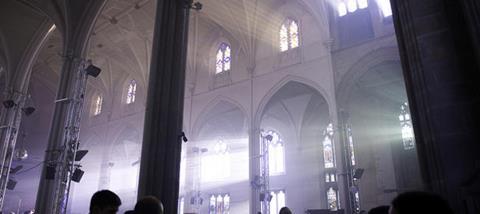
'Reports of my death have been greatly exaggerated'. So said writer Mark Twain after a 19th century newspaper mistakenly published his obituary.
The same could be said of the dear old Church of England. Some parts of the press just seem to be awaiting its inevitable demise after a long, drawn out illness. After all, the buildings are empty, the vicars are demoralised and normal people prefer to go to M&S on a Sunday now, don't they?
But, despite the tide of assumed decline, there are plenty of stories bucking the stereotype. When I recently spoke to Holy Trinity Brompton (HTB) leader Nicky Gumbel about his strategy for the revitalisation of CofE churches, he described a 'hidden revival' taking place.
That revival isn't so hidden in the case of some of the churches who are now bursting at the seams after HTB planted into historic Anglican church buildings on the verge of closure
Here, in the words of their vicars, are two stories to remind us that there's life in the Church of England yet:
Rev Archie Coates, vicar of St Peter’s, Brighton, describes how a team from HTB rescued the city’s ‘unofficial cathedral’ in 2005. They now welcome over 1000 people into the church for weekend worship services.
'St Peter’s is one of Brighton’s iconic buildings, so when it was due to close there was a huge public outcry and 6,500 people signed the petition to keep it open.
The building is incredible, but it’s also a nightmare because it’s crumbling. I remember giving sermons wearing hard hats. We didn’t have any heating for four winters, so people used to come to church in a hat carrying a hot-water bottle.
I think this is a visual aid for the wider work. The local churches all said that when the building looks like it’s closed and dying on its feet, that sends out the message to Brighton that that’s what God is like as well. But equally if you could do the opposite – open it up, fix it up – then that would send out the message: ‘Wow, the Church is alive and God is on the move.’
When we began, we were about 30, including children: our family and about three other families. If you’re going to attract other people to come, there needs to be a certain group for them to come into, and it’s quite hard to do that with less than 30. Also, in terms of establishing a DNA, if you’ve got people with you who already carry that from where you’ve planted from (in our case HTB), that really helps when others come in.
Now, as it’s grown, it has become more systematised, but at the heart I think it was: ‘Archie and Sam and their kids are going to go and live by the sea and see what we can do, and you’re welcome to join us.’'
Rev Tim Matthews, vicar of St Swithun’s in Bournemouth, whose HTB team planted into the empty church in September 2014, has seen rapid growth with over 500 now in regular attendance.
'Eleven adults and four children came down here last summer and we partnered with a small number of local people: one or two churches in Bournemouth. We didn’t go asking other churches, the people in their churches came to us and said: ‘We feel the Lord prompting us to get involved in this.’
As a general rule we don’t want anyone to leave the churches that they’re already in. I think it’s important to make clear that there’s only one Church in Bournemouth: Jesus has only got one Church.
In terms of the growth, there have been a lot of unchurched and de-churched people coming, and that’s primarily through Alpha and Sunday services, and people simply inviting their friends. I think the other big factor is new people moving to Bournemouth. We were told not to bother with student ministry because students don’t turn up to anything, but it’s been quite the contrary.
We are now nearing capacity and so we will have to plant new services. Over the period where it was all planned, we talked to a lot of people and there was a lot of prayer. I was convinced something exciting was going to happen, but the pace of it has outstripped that expectation.
My team joke with me when I say, ‘I really would rather less people were coming.’ They say: ‘You must be the only church planter in the country who wants less people!’ But it’s true, because actually there are a lot of problems that come with fast growth. But I think that’s what God’s doing, because the future for Bournemouth demands a lot of new experiments. There’s a huge work to be done here.'
Read the full story of how HTB are cultivating new church plants
To receive a free copy of Premier Christianity magazine click here
Photo: Archie Coates on Flickr


























